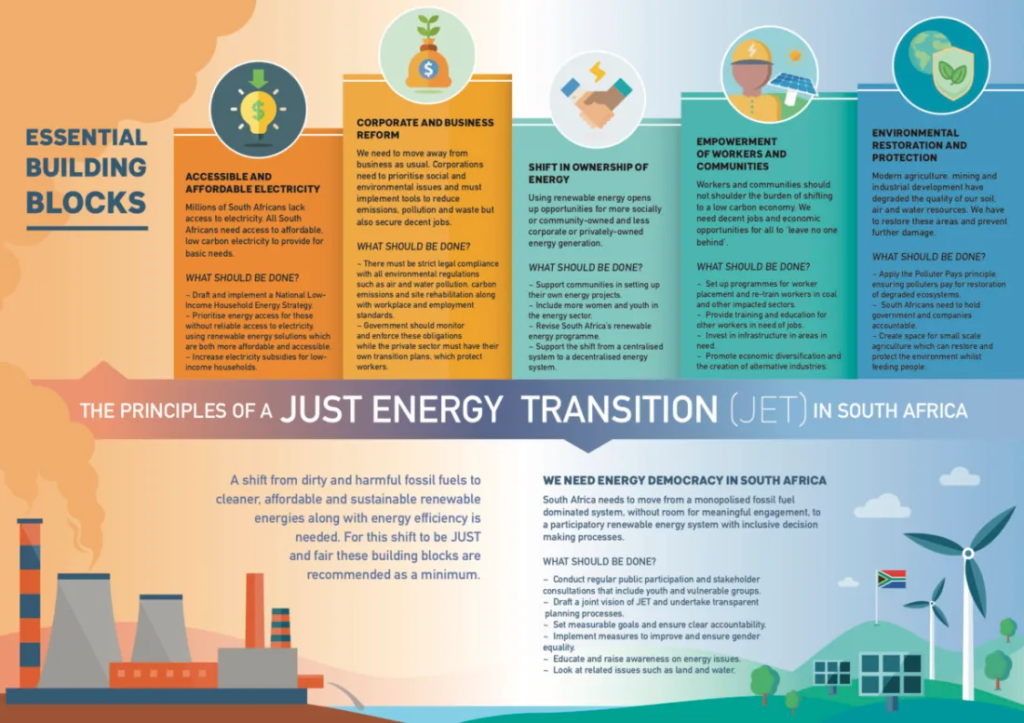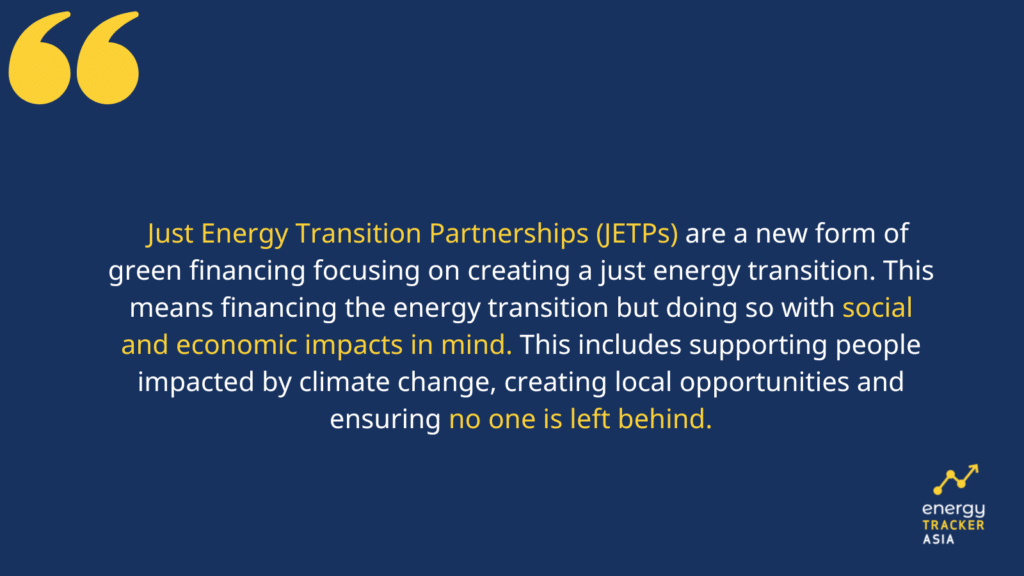What Are Just Energy Transition Partnerships?
17 January 2023 – by Eric Koons
If you are tuned into the environmental finance space, you may have heard the acronym “JETP” flying around. Just Energy Transition Partnerships, or JETPs, are a relatively new concept. Many people are asking the same basic question: What is a JETP?
What is the Just Energy Transition Partnership (JETP)?
Just Energy Transition Partnerships are a new form of green financing focusing on creating a just energy transition. This means financing the energy transitions but doing so with social and economic impacts in mind. This includes supporting people impacted by climate change, creating local opportunities and ensuring no one is left behind.
The International Institute for Sustainable Development (IISD) outlines a just transition approach “ensures that the affected people are considered by those making decisions”.
In the past, major transitions, such as industrialisation and automation, let major entities thrive but led to negative impacts for the majority. Due to these transitions, job losses, economic hardship and relocation have increased the wealth gap and damaged social systems.
Therefore, a just transition aims to prevent these problems in the ongoing transition to renewable energy.
COP26: The First Just Energy Transition Partnership
The first Just Energy Transition Partnership came during COP26, with France, Germany, the United Kingdom, the United States, and the European Union promising financing to South Africa. In total, these countries promised USD 8.5 billion to South Africa. The countries will provide this funding over the next three to five years to help the country decarbonise its economy and transition to renewables.
This falls in line with the general goals of Just Energy Transition Partnerships. The JETP framework exists to help underfunded, coal sector reliant emerging economies shift away from fossil fuels. As the transition takes place, it will address the social issues that arise.
In the case of South Africa, the JETP will focus on helping the country tackle its long-term agenda of reducing unemployment through economic growth and job creation. Additionally, it will aim to improve local livelihoods and ensure that the benefits and risks of the transition are shared across the country.

As this is the first JETP, the world is watching to see its successful implementation. As a result, South Africa and the JETP committee are providing annual updates. At COP27, the committee released the Just Energy Transition Investment Plan.
The Just Energy Transition Partnership funding will go toward a variety of projects. A few main investment targets include:
- decommissioning existing fossil fuel and coal-fired power plants, implanting clean energy technologies and strengthening the energy grid,
- reducing internal combustion engine (ICE) vehicles and promoting sustainable manufacturing,
- studying the feasibility and potentially implementing hydrogen production and energy use and
- providing training to repurpose workers from fossil fuel to renewable energy industry.
2022 G20 Summit: The Second JETP
One year after the first JETP, a second JETP led by the US and Japan was announced at the G20 summit in 2022. This Just Energy Transition Partnership will provide Indonesia with USD 20 billion over the next five years to phase out coal and develop renewable infrastructure. One main initial target of this investment is to help Indonesia generate 34% of its power from renewables by 2030.

A unique aspect of this JETP is that it includes financing from both public and private sector banks. This consists of the World Bank and private financial institutions, like Deutsche Bank and Bank of America.
Challenges For A Just Energy Transition
A just energy transition is critical for meeting global renewable energy targets and the Paris Climate Agreement. However, some challenges may hinder the process.
Firstly, as with the general energy transition, funding remains a significant roadblock. So far, funding has come chiefly from governments, with only a few private institutions starting to join. Significantly more involvement from the private sector is critical, as funding the global energy transition will be nearly impossible without its involvement. Moreover, an estimate by McKinsey puts the cost of the global transition at up to USD 275 trillion by 2050.

Secondly, creating social and economic opportunities is unique to each country. It will require significant government involvement in the developing countries receiving funding to ensure progress. Domestic development of skills, expertise and renewable energy infrastructure is crucial for helping local countries reap the rewards of the transition.
Meanwhile, support from international organisations and subject matter experts can help guide local policy implementation.
International Just Energy Transition Partnerships Will Propel Global Change
The growth of JETPs is a significant achievement. However, this is only just the beginning. There are 152 developing countries in the world, and most of these will need the private sector’s and developed nations’ support in their transition to renewable energy.
Therefore, the world must use the South African and Indonesian JETPs as a case study and framework for future projects.

by Eric Koons
Eric is a passionate environmental advocate that believes renewable energy is a key piece in meeting the world’s growing energy demands. He received an environmental science degree from the University of California and has worked to promote environmentally and socially sustainable practices since. Eric’s expertise extends across the environmental field, yet he maintains a strong focus on renewable energy. His work has been featured by leading environmental organizations, such as World Resources Institute and Hitachi ABB Power Grids.
Read more

